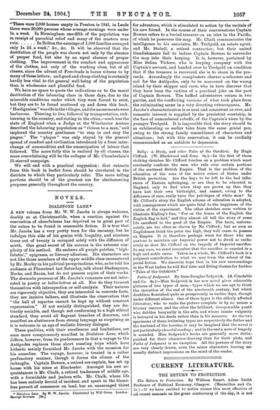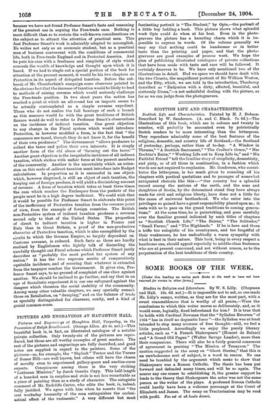THE RETURN TO PROTECTION. more difficult than so to restate
the well-known considerations on
the subject as to attract the attention of practical men. This feat Professor Smart's work is admirably adapted to accomplish.
He writes not only as an economic student, but as a practical man of business conversant with the conditions of commercial life, both in Free-trade England and in Protected America. And he puts his case with a freshness and simplicity of style which conceals the wealth of knowledge and thought upon which it is based. If we had to single out a special portion of the book for attention at the present moment, it would be his two chapters on Protection in its aspect of delegated taxation. Before the out- break of Mr. Chamberlain's campaign some observers pointed to the obvious fact that the increase of taxation would be likely to lead to methods of raising revenue which would seriously challenge the Free-trade position. In two short years the nation has reached a point at which an all-round tax on imports seems to be actually contemplated as a simple revenue expedient.
Those who do not realise the full bearings of such a breach as this measure would be with the great traditions of British finance would do well to refer to Professor Smart's observations on the incidence of indirect taxation. One great objection to any change in the Fiscal system which would introduce Protection, in however modified a form, is the fact that "the consumers are taxed, though they do not know it, for the benefit of their own producers." The Government "allows producers to collect the taxes and police their own interests. It is simply another form of the old abuse of `farming out the taxes.' " Another great objection is the inequitable incidence of all indirect taxation, which strikes with unfair force at the poorest members of the community. Another is the uncertainty which an exten- sion on this scale of indirect taxation must introduce into Budget calculations. In proportion as it is successful in one objects which, however disguised, is still an object of such taxation, the keeping out of foreign produce, it will yield a diminishing amount of revenue. A form of taxation which takes at least three times the sum which reaches the Exchequer from the pockets of the people must be in a high degree inefficient. We could wish that it would be possible for Professor Smart to elaborate this point of the inefficiency of Protective taxation from the revenue point of view, from the example of foreign countries. The British non-Protective system of indirect taxation produces a revenue second only to that of the United States. The proportion of direct to indirect taxation is higher in France and
Italy than in Great Britain, a proof of the non-productive character of Protective taxation, which is also exemplified by the b4aite to which the German Empire, so largely dependent on
Customs revenue, is reduced. Such facts as these are hardly realised by Englishmen who lightly talk of discarding the carefully thought out Fiscal scheme which Professor Smart justly describes as "probably the most perfect tax system of any nation." It has the two supreme merits of comparatively equitable incidence, and of securing that whatever is extracted from the taxpayer reaches the Government. It gives rise, Pro- fessor Smart says, to no ground of complaint of one class against another. We should be inclined to go further, and say that in an age of Socialistic experiment it is our one safeguard against the dangers which threaten the social stability of the community. Among many other valuable chapters, we may specially remark those on Retaliation, on "dumping," and on the balance of trade as specially distinguished for clearness, sanity, and a kind of genial common-sense.
PICTURES AND ENGRAVINGS AT HAUGHTON HALL.



































 Previous page
Previous page